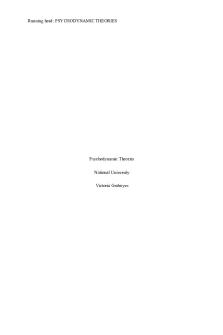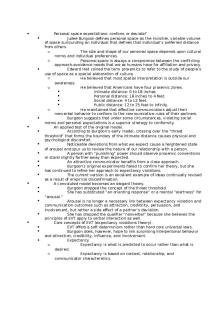Essay 7 - Pluralist Theory PDF

| Title | Essay 7 - Pluralist Theory |
|---|---|
| Course | Intro to U.s. Government |
| Institution | Santa Rosa Junior College |
| Pages | 4 |
| File Size | 41.3 KB |
| File Type | |
| Total Downloads | 63 |
| Total Views | 131 |
Summary
Pluralist Theory Essay Final Draft...
Description
The pluralist theory argues that large groups, instead of the electorate, actually control the democratic process in this country. Interest groups share common concerns and work to influence the government in making changes which benefit the group as a whole. The efficiency of these groups depends heavily on its size and many other factors. The pluralistic theory supports and restricts the democratic process in a constitutional republic. Interest groups are a collection of individuals who share common interests and work together to protect and promote their interests by persuading the government. The most common types of interest groups include economic, professional, religious, public interest, veteran, and intergovernmental. Economic interest groups have a significant influence on the government as they are the most popular and represent interests in business, labor, and agriculture. Professional groups, embody the economic securities for members of various occupations including doctors, engineers, and lawyers – often setting the guidelines for affiliation in their establishments. Most of these groups are managed by leaders who collect the opinions of their large memberships and translate them to the government by a means to make changes in certain aspects of society. The efficiency or effectiveness of interest groups relies on a variety of elements. These elements include size, degree of unity, organization, money, leadership, and well-defined goals. One of the most effective factors is the size of the group. For example, the American Association of Retired Persons constitutes 13% of the entire population in the United States. Meaning that if AARP requires the government to focus their attention on a particular issue, 13% of the whole population requires the government's attention. Also, if the underlining goals in which an interest group fights for are not clearly defined, members who participate have an unclear
conception of what the group's primary focuses include. The purpose of interest groups is to educate and direct the government to make changes based on the specific interests of the group, but if these groups are not efficient then influencing the government is impossible. In a pluralistic society, the roles of interest groups are to represent, prepare, educate, build agendas, and to monitor programs – all supporting the principal beliefs stated in the group's interests. The populations that make up these groups are the primary authority of the group's interests, which is then represented by the administrators to the government. It is also the administrator's job to prepare and educate their members on issues which contradict the group's overall beliefs. By having a cohesive group, both prepared and education, the group may then organize agendas, to shed light on a problem and promote the need for change. The United States operates in a constitutional republic. A constitutional republic is a system in which the head of state and different authorities are delegates of the general population and must oversee inside a current constitution. The governmental system is supported by the democratic process – the process by which citizens actively participate in governmental decision-making. By having citizens vote for state representatives who express the opinions of the electorate, provide individuals the opportunity to have an active part in the democratic process resulting in a more pluralistic society. Although the democratic process advocates the needs of the individual, it is almost impossible to make an impact alone. This is where interest groups are beneficial to the democratic process. These groups can influence lawmakers by their strong pull from popular opinion. Focusing their attention towards specific needs within their interests allows for the government to know what the citizens require. Also, by having multiple interests groups, whose
concerns differ in both volume and opinion, legislation can perceive which arguments are sustained by the mass population. With large groups having the ability to make changes within society, they greatly influence the democratic process by giving the individual more of an opportunity to have their opinions heard by the government. Even though interest groups positively influence the democratic process in a constitutional republic, they also hinder it. These large groups seek out benefits for minorities rather than the greater good of the majority – solving issues which only benefit those involved in the groups and not issues that affect the entire population. Also, too many interest groups can lead to "hyperpluralism" – a political system that caters only to interest groups and not the entire population. Potentially resulting in a society saturated by interest groups and a government that only meets the needs of the groups and not the majority population. Hyperpluralism would isolate individuals and hinder a pluralistic society. In addition, Interest groups are not always working to promote equality. Racist associations like the Klu Klux Klan, an American white supremacist hate group, work to take away from equality, hindering the fundamental ideologies of the constitution. A pluralistic society is one that functions in harmony as a whole — giving every individual the ability to be heard with no single group or leader accommodating complete authority. The founders intent was to create an individualistic community, which led to the creation of interest groups. These groups benefit the democratic process by providing minorities the ability to make beneficial changes in society and have an impact on the governmental process. However, they also hinder the process by potentially over saturating society with interest groups, forcing the government to only act on the concerns of the minority and not the
majority. The pluralist theory offers American citizens an outlet in which may be utilized to produce change by influencing those in authority, giving individuals the ability to improve and promote a pluralistic society....
Similar Free PDFs

Essay 7 - Pluralist Theory
- 4 Pages

MN1115 Essay Organisation Theory
- 6 Pages

Example Essay Conflict Theory
- 8 Pages

Classical Social Theory Essay
- 3 Pages

Essay - Social Cognitive theory
- 6 Pages

Rational Choice Theory - Essay
- 9 Pages

Theory Essay sya4110
- 4 Pages

Hanson theory Essay
- 1 Pages

Psychodynamic Theory Essay
- 8 Pages

Mudsill Theory Essay - Grade: A
- 3 Pages
Popular Institutions
- Tinajero National High School - Annex
- Politeknik Caltex Riau
- Yokohama City University
- SGT University
- University of Al-Qadisiyah
- Divine Word College of Vigan
- Techniek College Rotterdam
- Universidade de Santiago
- Universiti Teknologi MARA Cawangan Johor Kampus Pasir Gudang
- Poltekkes Kemenkes Yogyakarta
- Baguio City National High School
- Colegio san marcos
- preparatoria uno
- Centro de Bachillerato Tecnológico Industrial y de Servicios No. 107
- Dalian Maritime University
- Quang Trung Secondary School
- Colegio Tecnológico en Informática
- Corporación Regional de Educación Superior
- Grupo CEDVA
- Dar Al Uloom University
- Centro de Estudios Preuniversitarios de la Universidad Nacional de Ingeniería
- 上智大学
- Aakash International School, Nuna Majara
- San Felipe Neri Catholic School
- Kang Chiao International School - New Taipei City
- Misamis Occidental National High School
- Institución Educativa Escuela Normal Juan Ladrilleros
- Kolehiyo ng Pantukan
- Batanes State College
- Instituto Continental
- Sekolah Menengah Kejuruan Kesehatan Kaltara (Tarakan)
- Colegio de La Inmaculada Concepcion - Cebu





